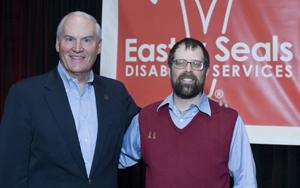by Beth Finke
In my “Adults and autism: Our kids might outlive us” post last year, I told readers that
Mass Mutual, one of Easter Seals’ national corporate partners, offers helpful resources for people with disabilities and their families when it comes to estate planning.
Now I’m starting to think, hey, maybe a Chicago Tribune columnist is reading our blog! Humberto Cruz mentions MassMutual and Easter Seals when answering a reader’s question in yesterday’s Chicago Tribune about special trusts for children with autism.
Q: My 10-year-old son has autism and will need care the rest of his life. This has put quite an emotional and financial strain on my husband and me. His parents and mine are willing to help, but we’ve heard it’s not a good idea to put our son in their will because it might affect his ability to qualify for financial aid. Can you shed light on this?
Take it from me: it’s true. Experts recommend families prevent assets from going directly to a child with a disability. Our son Gus was still a teenager when my husband and I set up a special trust for him — when people with disabilities or special needs own or inherit property above a certain dollar value (generally $2,000) they risk becoming ineligible for certain government programs, such as Supplemental Security Income and Medicaid.
“The government doesn’t go out and advertise it. A lot of times families are not aware of that fact,” said Joe Eppy, a special-care planner in Florida with the MassMutual SpecialCare program, which assists people with disabilities and other special needs, and their families.
A better solution, experts in the field say, is to set up a special-needs or supplementary-needs trust that allows families to safeguard the child’s eligibility for benefits while also providing for additional needs not covered by government programs.
Understandably, for many families dealing with the day-to-day struggles of caring for a disabled child, “the last thing in their minds is planning for the future,” said Joanne Gruszkos, founder of the MassMutual program.
But it is important for parents to take the right steps to make sure their child is cared for after they die. That’s particularly the case with autistic children: People with autism tend to have a longer-than-normal life expectancy, Gruszkos said, and therefore could need care longer.
After turning to those experts at MassMutual, the Tribune columnist goes to other experts — us!
Easter Seals, which offers services to people with disabilities and their families, recommends that in addition to setting up a special-needs trust, parents of disabled children draft a “letter of intent.” This letter, while not legally binding, provides a guide for the child’s caregivers or the courts on how the parents would like the child to live after they die.
“With Open Arms,” an informative 72-page guide by Easter Seals and the National Endowment for Financial Education, includes a worksheet to help parents begin writing such a letter.
You can download With Open Arms for free at our web site.
For a printed copy, send a $5 check (for shipping and handling, payable to Easter Seals) to:
With Open Arms/Easter Seals
230 W. Monroe St.,
Suite 1800
Chicago, IL 60606.
The printed guide can also be ordered free from the MassMutual SpecialCare site, where parents and caregivers can also request a free compact disc containing a fillable Word document template for a letter of intent.
Read more about MassMutual’s SpecialCare program.







